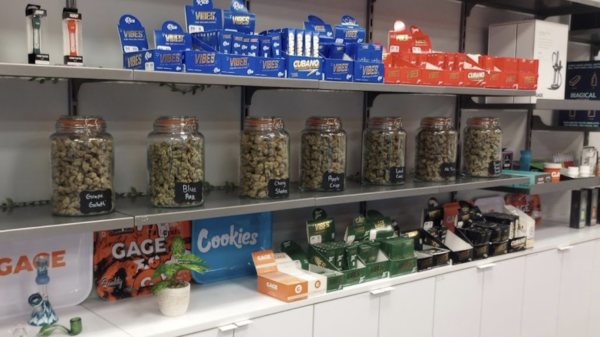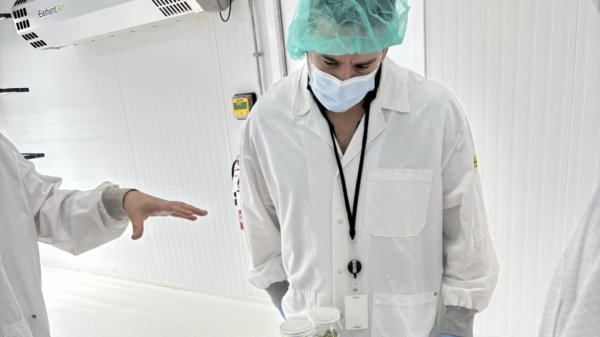Producing one kilogram of cannabis flowers generates as much carbon dioxide as flying roundtrip from Vancouver to Germany five times.
However, a researcher at the University of British Columbia (UBC) and Aurora Cannabis Inc.’s (NASDAQ: ACB) director of genetics Jose Celedon aim to adapt outdoor cannabis production techniques to reduce 96 per cent of carbon emissions in the industry.
The project “Adapting cannabis for outdoor production to reduce greenhouse gas emissions” is an initiative led by UBC’s Marco Todesco and Aurora’s director of breeding and genetics Jose Celedon. The project was allotted a budget of $250,000 and it started in 2022.
It aims to reduce the carbon footprint of cannabis production, which currently accounts for about 4 per cent of the total greenhouse gases from Canadian agriculture, despite occupying less than 0.01 per cent of cultivated land.
The research is one of eight new projects that will be funded by the Genomic Innovation for Regenerative Agriculture, Food and Fisheries (GIRAFF) grant that addresses challenges in the agriculture and aquaculture sectors that stem from climate change.
GIRAFF is a collaboration between Genome BC and the Investment Agriculture Foundation of BC (IAF) with support from the BC Ministry of Agriculture and Food.
Read more: Avicanna teams up with Langara College to research cannabinoid formulations
Read more: UBCO study looking at impact of cannabis use among Indigenous peoples
Cannabis outdoor production could greatly reduce carbon footprint
The high carbon footprint is largely due to indoor production methods that consume significant amounts of natural gas and electricity for heating, cooling, humidity management and high-intensity lighting.
A potential solution is to switch to outdoor production, which could reduce emissions by 96 per cent according to preliminary estimates.
However, outdoor production in high-latitude locations like British Columbia is challenging due to the sensitivity of elite cannabis varieties to day length, which delays flowering until late summer and leaves insufficient time for buds to mature before cold/rainy weather arrives.
To overcome this, the team is working to develop high-quality outdoor varieties by characterizing the autoflower gene in hemp and introducing this trait into elite cannabis lines. The team will use genomics technologies to locate the autoflower trait in the genome and understand its effects on plant growth, productivity and quality.
The project could enable outdoor cannabis production in high-latitude locations globally, leading to a significant reduction in emissions from cannabis production, lowering the cost of production and making BC-grown cannabis more competitive globally.
Aurora and UBC have partnered in cannabis research in the past
In 2020, Genome BC and Aurora, partnered with researchers at the university to identify and isolate desirable breeding traits such as resistance to powdery mildew infections.
Todesco led the project Fast-Track Breeding of Powdery Mildew-Resistant Cannabis which was part of a $10 million project that also included genomic testing to monitor domestically bred grape crops.
Aurora recently filed a provincial patent application on powdery mildew resistance to use in its growing operations.
Read more: Aurora launches cannabis genetics business Occo
Read more: Industry praises North 40’s integrity amid powdery mildew outbreak
GIRAFF program funding totals $1.84M
The GIRAFF program will offer $1.84 million in total to the eight projects in the agriculture and aquaculture sectors.
The projects range from developing disease and drought-resistant hop varieties to enhance their resilience and revitalize BC’s hops industry, to creating genomic resources for two keystone kelp species to guide conservation efforts.
One project investigates how plants grown under slight nutrient limitations can stimulate root activity, promoting nutrient mobilization and carbon sequestration. Another one looks into fast, DNA-based diagnostic tests being developed to monitor cereal pathogens, contributing to an early-warning system for Canadian farmers.
Another project will study how landscape differences, weather patterns and food availability impact bee health. As well as a project looking into a new bacteriophage being designed to treat bacterial blight of blueberries, providing a green technology alternative to conventional treatment approaches.
A seventh project involves a genomic tool being created to determine the current climate resilience of chinook salmon stocks and their capacity to evolve increased tolerance for events, such as heatwaves.
“Climate change poses significant challenges to global agriculture. To face these challenges and ensure food security we must develop crops that are more resilient, productive, and adaptable,” said Christopher Reed, Chief Operating Officer at IAF.
“The use of genomics in agriculture will advance the development of climate-resilient crops, thereby enhancing food security and promoting sustainable agricultural practices that demand fewer resources.”














